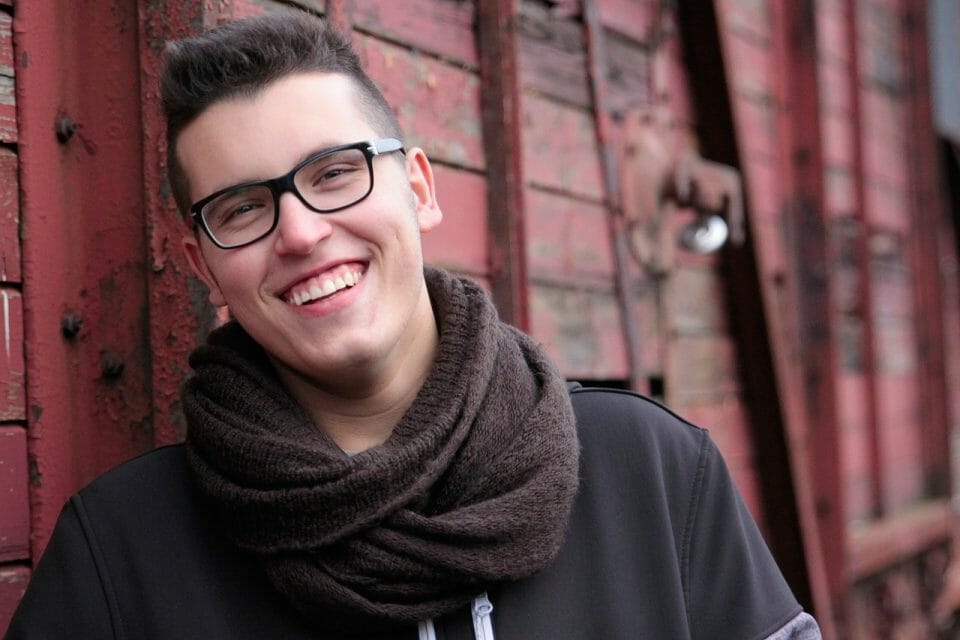
About 16 years ago, I went to visit a family member, who had her first child at the age of 42. I was very happy for her and traveled for 2 hours to see her precious new baby.
She was so overwhelmed by the 10 days of the “mom experience” she had had – sleepless nights, initial breastfeeding pains and crying – that for about 3 hours, she kept saying to me, “Ronit, just wait until you have a baby. Then you’ll see”, and I just smiled.
You see, motherhood can be hard at first, but when she said that, my own daughter was already 3 years old and I loved every minute of raising her and considered it a lot more rewarding than difficult.
Eden grew up to be a wonderful girl, and all my friends and acquaintances adored her. However, when Tsoof was about to be born, many of them said, “You won’t get lucky with every child, you know. Just wait and see what trouble you get from your second child, because he will be different for sure”.
I waited and waited and nothing (bad) happened.

Tsoof was very different indeed, but he was also a very good baby and wonderful kid. Sure, he was a boy and did other things, but overall, raising him was as rewarding as raising Eden, and easier, because she helped.
I think this attitude is following me around. Over the years, many people have said to me, “Just wait until you have teens, then you will really have a hard time”. I usually smile and say, “Thank you for the compliment”, because they think I look young.
But I already have 2 teenagers – 19 and (nearly) 13 years old – and there was nothing horrible to wait for. Their teen years are just as pleasant and fulfilling for me as a parent as their early childhood, if not more.
I think many people, having had some difficult experiences with their kids, especially with teens, form a shield to defend themselves from disappointment, from pain or from the loss of more and more control as their kids grow up.

In order to feel better, they try to recruit other parents into a group and form a collective shield against everybody’s kids together. Perhaps they are thinking, “Maybe together we’ll be able to survive these hard years”.
But I think shields are heavy things to carry.
What your kids don’t know won’t hurt you
My kids did not know they were supposed to behave differently when they got to their teen years. I had been warned so many times before my daughter became a teenager that most people did not even notice that my daughter was almost completely past her teens and still offered me the same shield.
“Just wait for her to be a teenager”, “Just wait for her to have her first boyfriend”, “Just wait for her to finish school”, “Just wait for her to start driving”…
I waited and waited and nothing (bad) happened.
I believe it is the expectation parents have that their kids will turn into monsters upon entering the teenage years, which makes life hard for everyone. I say that parenting from behind a shield is hard.

Recently, I went to a “girls’ night out” and I was showing off, talking with pride about my kids’ adventures and achievements (I am having a peacock period) and one of my friends, who was having difficulties with her teenage son, asked me, “How do you manage the teen years so well, and with 2 of them?”
Well, first I told her to go to my blog, Family Matters, because this is where I write exactly how I do it. Every day, I give my readers insight into the way I parent and I will continue to do so.
Then, I thought it was probably too long to discuss teenagers over dinner, so I gave her the shortened version.
If you understand the power of self-fulfilling prophecies or the Law of Attraction, you probably know that if you expect something to happen, it is more likely to happen
Ronit Baras
20 tips for parents of teens
When I went home, I decided to write about it. Here is how I did it.
- Teens are first of all kids and it is the parents’ responsibility to design a family that will cater for their growth and development
- Talk with your kids about the wonders of your teen years and keep in your memory that glory. It will help you embrace those years when your kids become teens.
- Do not fall into the trap of, “The teens today…” discussions. It thickens the shield, creates a gap between parents and teens and starts the war of “us” and “them”, which is one of the major frustrations for teens. Deal with the person in front of you, your own child, not with the notion of “teenagers”, and help him or her cope.
 Never lie to your kids, even when they are tiny tots. One day they will grow up and think this is valid behavior in family relationships. You do not want to go that way. When they are teens, you can demand honesty and confidently say, “I’ve never lied to you”.
Never lie to your kids, even when they are tiny tots. One day they will grow up and think this is valid behavior in family relationships. You do not want to go that way. When they are teens, you can demand honesty and confidently say, “I’ve never lied to you”.- Never bribe kids to do things you want. I remember a friend we had in California, who said to her 5 year old son every time we went to eat out (3-4 times a week), “If you eat your meal, you’ll get an ice cream”. Like magic, every time we went to eat out, he would say to her, “No, if you give me ice cream, I’ll eat my meal”. After he finished his ice cream, he never ate his meals. While most parents start out more sophisticated than their kids, bribing or blackmailing backfires quickly and is a lost battle with teenagers. Worst of all, having learnt it from you, when your teenager starts to use this technique to get what they want, you are doomed.
- Drop the Superman outfit and be human – Do not try to pretend to be strong, knowledgeable and capable when you feel sad, disappointed or helpless. Tell your kids how you really feel, show them all your shades, so they will not be shocked when they become teenagers and all of a sudden discover that Mom and Dad and not super parents.
- Remember that kids are mirrors. If there is something in their behavior you do not like, ask yourself “When and where am I behaving in the same way?” It is much easier to control your own behavior than it is to control others’.
- When your kids go through a tough patch, ask “What can I do to help you?” It is better to start asking this question since they are six years old to plant in their head that you are always there to help them. When parents and teens are in conflict, it is harder for them to ask for help – offer it!
- Family is an institution and needs management. Parents are managers. Learn management skills and be a good manager. Remember that kids can never run the family. This is your job and you took this responsibility on yourself when you made the decision to bring them into the world.
 Communication is not you telling your kids what to do. Communication is a two-way street of exchanging feelings, ideas and thoughts. Make sure it is 50-50% exchange. In communication, age does not give you any extra privileges. If anything, it should teach you to listen. You need to listen as much as you talk.
Communication is not you telling your kids what to do. Communication is a two-way street of exchanging feelings, ideas and thoughts. Make sure it is 50-50% exchange. In communication, age does not give you any extra privileges. If anything, it should teach you to listen. You need to listen as much as you talk.- Avoid threatening, but if you do, mean it! I have seen so many kids looking at their parents with disrespect when they are threatened and then nothing happens to them. It is better to let go of things rather than to threaten and then not follow through. If you want to feel confident with your “punishments”, think about them before you threaten and make sure your kids are aware of them. If you say you are going to punish your kids and show them you mean it, you may not need to threaten again.
- When you are upset with your kids, start your sentences with “I” rather than “you”. This teaches the best lesson in life – responsibility. Notice that when you start with “you”, this is when a conflict begins.
- When you are doing things for your kids and they are not happy about it, do not say, “I do it only because I care about you”. Caring is something that is built into a relationship over time. Caring does not mean you can say or do whatever you think and feel to your teenagers. Use their feedback to get better results over time.
- Be very generous with your love expressions. Kids need to feel loved when they are babies, toddlers, teens and even when they are not kids anymore. Say “I love you” every day of your life to fill their love tank. The teen years are not easy and they need to use much of the love you give them to overcome difficulties. Make sure their tank is full before they reach their teen years.
- Be direct in your communication with your teenage kids. If you want something, say what you want and avoid “pink elephants“. Instead of saying “I do not want you to hang around with irresponsible kids”, say, “I would rather you hung around with responsible kids”.
- If you find yourself in conflict, negotiate. Keep the communication going at all costs. Forget “my way or the highway”, because many teens prefer “the highway” – do not give them ideas you do not want them to adopt.
- Choose your parenting style and be consistent. If parents are consistent, kids gain certainty and feel secure in their life. Strict parents whose reactions are easy to predict are better that chaotic parents who change their opinion at the slightest sign of pressure. If you are not consistent, it is hard to expect your kids to be consistent (remember rule #7 – kids are mirrors).
 School work, which is one of the biggest causes of parent-teen conflicts, is actually the kids’ responsibility. Your responsibility is to help them make the best of it, but it is their responsibility to learn. Appreciate learning and remember that it is not about you giving the information to them, but rather them taking what you have to give. Create a happy, positive atmosphere of learning in your family life. Keep learning yourself and be excited about it.
School work, which is one of the biggest causes of parent-teen conflicts, is actually the kids’ responsibility. Your responsibility is to help them make the best of it, but it is their responsibility to learn. Appreciate learning and remember that it is not about you giving the information to them, but rather them taking what you have to give. Create a happy, positive atmosphere of learning in your family life. Keep learning yourself and be excited about it.- Time is the most precious thing you can give your teens. Spend time with them. Aim to schedule for your teen individual time with each parent and make sure it is quality time for both parent and teen.
- No matter what they do, tell them you will come to help them, even if it means having to find them on the other side of the world.
I think that learning about your teens is a great way to help them go through adolescence and come out on the other side happy and positive about life.
The reason it is hard to be a teenager is that at that stage, parents tend to form such a thick shield, that their teenagers cannot reach them. Touch them and allow them to touch you, and this will also help increase your happiness as a parent.
The shield must go
The walls we build around us to keep sadness out also keep out the joy
Jim Rohn
Conflicts between parents and teens go hand in hand with the presence of the shield, so the shield must go.
Remember: teen years are wonderful, exciting years and if we dedicate much of our energy and effort into putting up a shield against them, the shield will form and thicken and then we will not be able to feel the ones we love most.
If you have a shield already, and you want to improve your relationship with your teen, do everything you can to release yourself from the heaviness of carrying it around. You do not need it! Parenting without shields is the most wonderful experience ever and you have all the right to enjoy it.
 Buy Be Special, Be Yourself for Teenagers as another great way to communicate with your teen!
Buy Be Special, Be Yourself for Teenagers as another great way to communicate with your teen!
If you are forming a shield, make a conscious decision to let go of these thoughts and beliefs of fear about the teenage years. If you are a parent with a shield up in fear of difficulties and problems, it may be that the hits are not so painful, but in doing so you give up the pleasure, the pride and the happiness of sharing your teen’s ride through life.
If your kids are young and others say, “Just wait for them to become teenagers”, recognize the shield that they carry and realize that what they are offering you is to join them in a battle against the most precious things in your life – your kids.
If you appreciate that it is more important to have a close and loving parent-teen relationship, rather than having a relationship based on control, then you will fly through those teenage years and have the most wonderful and unique memories of this age to carry with you and pass on to your teens.
Happy parenting your teens,
Ronit
 Never lie to your kids, even when they are tiny tots. One day they will grow up and think this is valid behavior in family relationships. You do not want to go that way. When they are teens, you can demand honesty and confidently say, “I’ve never lied to you”.
Never lie to your kids, even when they are tiny tots. One day they will grow up and think this is valid behavior in family relationships. You do not want to go that way. When they are teens, you can demand honesty and confidently say, “I’ve never lied to you”. Communication is not you telling your kids what to do. Communication is a two-way street of exchanging feelings, ideas and thoughts. Make sure it is 50-50% exchange. In communication, age does not give you any extra privileges. If anything, it should teach you to listen. You need to listen as much as you talk.
Communication is not you telling your kids what to do. Communication is a two-way street of exchanging feelings, ideas and thoughts. Make sure it is 50-50% exchange. In communication, age does not give you any extra privileges. If anything, it should teach you to listen. You need to listen as much as you talk. School work, which is one of the biggest causes of parent-teen conflicts, is actually the kids’ responsibility. Your responsibility is to help them make the best of it, but it is their responsibility to learn. Appreciate learning and remember that it is not about you giving the information to them, but rather them taking what you have to give. Create a happy, positive atmosphere of learning in your family life. Keep learning yourself and be excited about it.
School work, which is one of the biggest causes of parent-teen conflicts, is actually the kids’ responsibility. Your responsibility is to help them make the best of it, but it is their responsibility to learn. Appreciate learning and remember that it is not about you giving the information to them, but rather them taking what you have to give. Create a happy, positive atmosphere of learning in your family life. Keep learning yourself and be excited about it.










